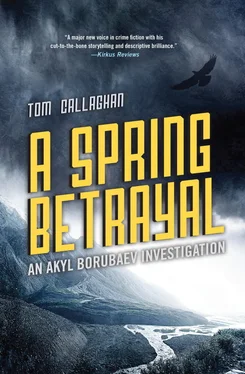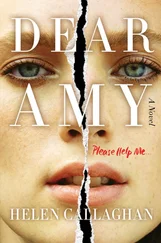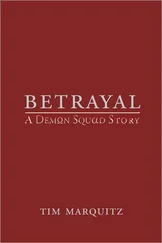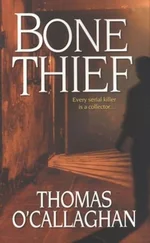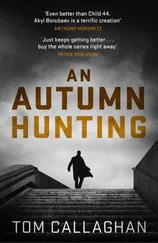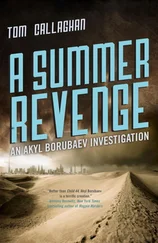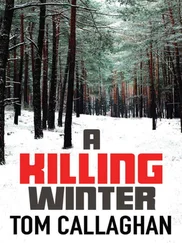“That means some high-powered equipment. Or a source within the phone company,” I said. “Expensive. Connected.”
Saltanat looked at me, and I could see a savage anger in her face.
“Or in the police force or state security,” she said, turned, stared out of the window. I made no move to hold her, comfort her. Outside, the world continued, the uncaring song of birds, the random hiss of leaves upon the wind.
And then we heard footsteps in the hallway.
I stepped behind the door, gun held up by my cheek, ready to shoot. The footsteps stopped, and there was a moment’s silence. I could hear breathing, or rather, gasping, together with a noise I realized was weeping. There was a light knock on the door.
“Rustam?”
A woman’s voice, terrified.
I pulled the door open, took aim at chest height, to be greeted by hysterical screaming. The woman who stumbled and fell to the floor was one of the hotel’s chambermaids, Rosa. The bag she was carrying split open, onions and potatoes rolling around my feet.
I got my breath back under control, holstered my gun, offered the girl my hand. She only screamed louder when she saw Rustam’s blood smeared up to my wrists. The crotch of her jeans turned a darker blue as she raised her arm to cover her eyes, then she fell and scrambled back toward the stairs. The reek of urine mingled with the stink of blood.
“Rosa, it’s all right, you’re safe,” Saltanat said, her voice calming, soft. “You know us, we’re friends.”
But the girl kept screaming, her eyes clamped shut, her palms tearing at her cheeks, pressing herself against the wall to make herself as small a target as possible.
I looked at Saltanat, gestured toward the stairs. Someone would have heard the shots, the screams; we had very little time before the police arrived. Or the killers returned.
“We can’t just leave her like this,” Saltanat said, touching the girl’s shoulder, watching her flinch.
“You want to bring her with us?” I asked, already heading down the stairs. “That puts her in a lot more danger than she’s in now. And us.”
“What’s wrong with you, Akyl?” Saltanat snapped. “She needs help.”
I sighed and turned back up the stairs.
“Take her other arm,” I ordered. “We can at least get her away from the bodies.”
Between the two of us we helped the weeping girl stagger down the stairs into the hotel dining room. Saltanat opened a liquor cabinet, poured a glass of vodka. Rosa choked as she drank it, but her tears slowed and she grew slightly calmer.
“Now can we go?” I asked, and started for the door. Saltanat gave me a look that would melt snow off Mount Lenin, but followed me. I unlocked the gates while Saltanat made a call.
“Murder Squad?”
“Ambulance. For Rosa,” she said, and pushed past me toward the car, her shoulder slamming into mine. She climbed into the driver’s seat, started the engine. As the car pulled away, she used her phone to take a photo of the hotel sign; I had to scramble to get into the passenger seat.
“What the fuck? Were you about to leave me?” I snarled, grabbing at the dashboard to prevent myself going headfirst through the windshield.
“The asshole you seem to have become, I can well live without. I can be over the border in a couple of hours, and then you can get yourself killed without my help.”
I stared out of the window, lit two cigarettes, passed one to Saltanat. I wound down my window to let the spring air cool me down.
“Sorry,” I said, tried to make it sound genuine. Saltanat took the cigarette, took a long draw. The adrenalin was starting to slacken off, and I felt as if my shoulders had been beaten with iron bars.
The Lexus bounced around on what was not much more than a potholed track, pushing forward between one-story shacks with corrugated-iron roofs hiding behind mud-brick walls and tumbledown gates. I had only the vaguest idea of where we were, somewhere north and east of Ala-Too Square, but Saltanat clearly knew where we were headed.
“Sorry,” I repeated, and this time put a little sincerity into it. Saltanat gave me a suspicious glare, then seemed to relent slightly.
“The hotel’s blown, and we can’t go to your apartment, obviously,” she said, hurling the car into a ninety-degree turn that lifted two tires off the road. “We’ll use my safe house, at least for a couple of days, while we decide what to do next.”
I remembered the safe house from the Tynaliev affair. We’d taken a pakhan , a mafia boss, there, threatened to torture him and have his granddaughter raped, then sent him on his way, promising his revenge. That never happened though, because twenty minutes later one of Saltanat’s Uzbek security colleagues put two bullets in him. One in the back of the head to denote an execution, one in the mouth to say he’d talked beforehand. I’d not been back since, and the thought of returning didn’t ease the gloom.
The safe house was on the eastern edge of Bishkek, three stories surrounded by a two-meter wall and blue ornamental sheet-metal gates. Saltanat unlocked the heavy steel door and we entered. It was no more cheerful than I remembered it, though not quite as bitterly cold. Unfurnished rooms, stained wallpaper peeling in places, spots and blisters of mold seeping through damp plaster, bare wooden floorboards. And beneath us, the cellar and furnace room, with everything required to make a man betray his family, his friends, anything to stop the pain. Simple things for the most part: coal tongs, a hammer, chisels and screwdrivers, kitchen scissors, boiling water. It doesn’t take much to persuade someone of the righteousness of your cause.
Then I remembered Graves’s cellar, the blood-soaked butcher’s slab, the thick leather belts, the straps, and video equipment to capture every scream, every spasm. For a moment, my head was spinning, I thought I was going to vomit again and rested one hand against a clammy wall.
Saltanat saw my distress, helped me slide down the wall until I sat on the floor, knees drawn up toward my shoulders, my hands shaking as if I had a fever.
“Sorry,” I said, for the third time in an hour, as if apologies could ever change things, ever heal the sick or bring the dead back to life. Sorry means clutching at hope the way a man swept away by a raging river tries to grasp an overhanging bough. Sorry sounds good, but it changes fuck-all.
“You want some water?” Saltanat asked. I shook my head, then reconsidered. My throat was too dry to speak, so I simply nodded. Saltanat returned from the kitchen with a bottle of water. It was warm, and flat, but I emptied the bottle in a few desperate gulps. I rinsed my mouth, spat out the last of the water, looked up at Saltanat. The words I wanted to say were trapped in my throat, handcuffed by sorrow and fear.
She stared down at me, pity in her face, for what I had once been and what I had now become. I knew what I had to do, knew it would change everything.
“I want you to go back home, Saltanat, back to Tashkent. This isn’t your battle, the dead aren’t your people, there’s no reason why you should risk your life on our behalf.”
Saltanat opened her mouth to speak, but I held up a silencing hand.
“This is hard enough for me to say, without you making me change my mind and keeping silent. I’m a coward, you see, and by not telling you the truth, I’m betraying how I feel for you, how you might feel for me. So I have to speak.”
I looked up at her, remembering my past, which lay between us like a river in full flood between two banks.
“Believe me, Akyl, I know you’re not a coward. I’ve seen that over and over, ever since I first met you. You care too much for other people ever to be that.”
Читать дальше
